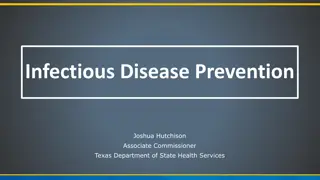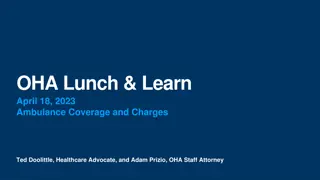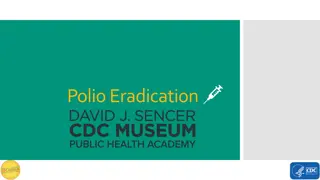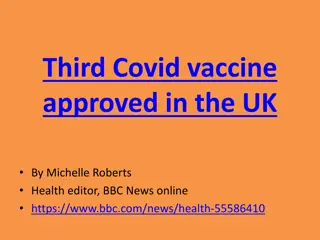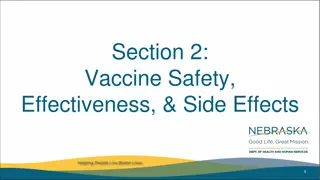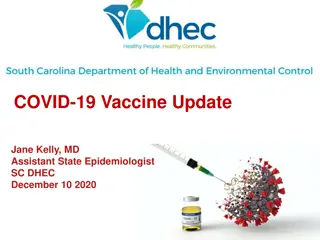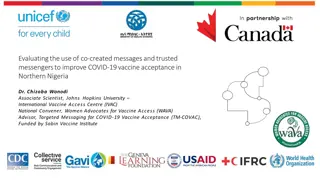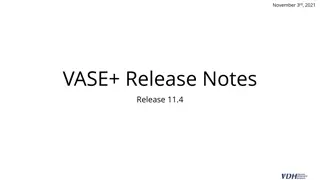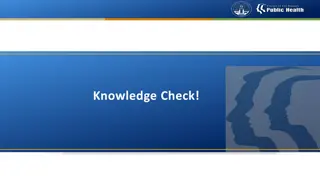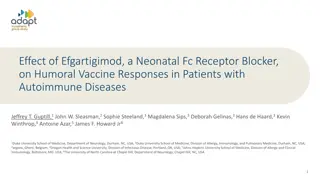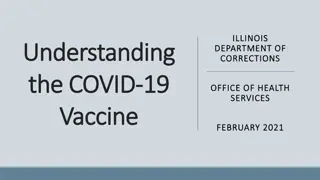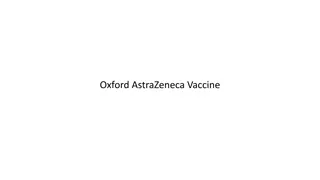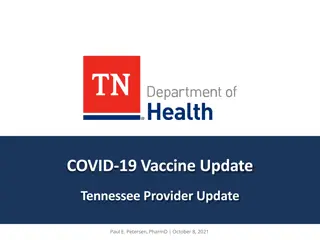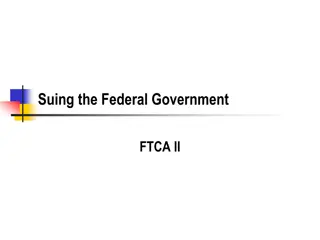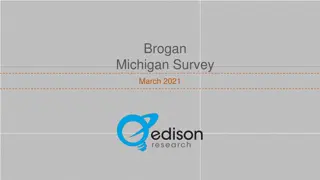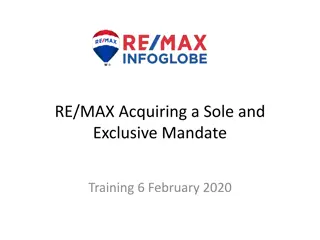Legal Issues Arising from Vaccine Mandates
This content discusses notable vaccine mandate decisions from the Supreme Court of the United States, focusing on cases like Jacobson v. Massachusetts and Biden v. Missouri. It explores the historical context, legal implications, and arguments surrounding vaccination mandates in the healthcare and public health sectors.
Download Presentation

Please find below an Image/Link to download the presentation.
The content on the website is provided AS IS for your information and personal use only. It may not be sold, licensed, or shared on other websites without obtaining consent from the author. Download presentation by click this link. If you encounter any issues during the download, it is possible that the publisher has removed the file from their server.
E N D
Presentation Transcript
Table 7 Legal Issues Arising from Vaccines April 6, 2022
Notable vaccine mandate decisions from the Supreme Court of the United States Jacobson v. Massachusetts, 197 U.S. 11 (1905). States have police power to mandate vaccination. Biden v. Missouri, 142 S.Ct. 647 (January 13, 2022). Department of Health and Human Services has statutory/regulatory power to mandate vaccination at healthcare providers that care for Medicare and Medicaid patients. National Federation of Independent Business v. Department of Labor, 142 S.Ct. 661 (January 13, 2022). Department of Labor does not have statutory/regulatory power to mandate vaccination for nation s workforce.
Jacobson v. Mass., 197 U.S. 11 (1905). To combat smallpox, Massachusetts enacted a law that delegated to municipal boards of health the power to require adults over 21 years old to be vaccinated subject to criminal penalty (a $5 fine). Jacobson challenged the mandate on a variety of grounds, which the Court mostly construed to be in derogation of the rights secured to him by the 14th Amendment. The Court held that the States have the police power to mandate vaccination.
Jacobson v. Mass., 197 U.S. 11 (1905). Cited: 693 times from 1905 through 2019; and 425 times from 2020 through 2022. Some of Jacobson s other arguments against the vaccine mandate: Some people (doctors included) think vaccines are dangerous. Vaccines might cause other diseases in children. What if schools start mandating vaccines for children?
Jacobson v. Mass., 197 U.S. 11 (1905). We are not prepared to hold that a minority, residing or remaining in any city or town where smallpox is prevalent, and enjoying the general protection afforded by an organized local government, may thus defy the will of its constituted authorities, acting in good faith for all, under the legislative sanction of the state. If such be the privilege of the minority, then a like privilege would belong to each individual of the community, and the spectacle would be presented of the welfare and safety of an entire population being subordinated to the notions of a single individual who chooses to remain a part of the population. Footnote 1 provides a history of vaccination mandates from around the world beginning in the early 1800s.
Biden v. Missouri, 142 S.Ct. 647 (2022). To combat COVID-19, the Department of Health and Human Services (Centers for Medicare and Medicaid Services) mandated vaccination of all employees (subject to medical and religious exemptions) of employers that accept Medicare and Medicaid funding. HHS has the authority to promulgate regulations as may be necessary to the efficient administration of the functions of which [HHS] is charged. See, e.g., 42 U.S.C. 1395x(e)(enabling statutes). The mandate is consistent with HHS s enabling statutes and its long-established requirements that healthcare providers maintain and enforce infection prevention and control programs.
Biden v. Missouri, 142 S.Ct. 647 (2022). Dissent (Justice Thomas joined by Justices Alito, Gorsuch and Barrett). The enabling statutes only allow HHS to impose administrative requirements and bureaucratic rules, not substantive health requirements. Dissent (Justice Alito joined by Justices Thomas, Gorsuch and Barrett). The interim rule was not promulgated in accordance with the necessary notice and comment periods.
National Federation of Independent Business v. Department of Labor, 142 S.Ct. 661 (2022). To combat COVID-19, the Department of Labor (Occupational Health and Safety Administration) mandated vaccination of all employees of employers (subject to medical and religious exemptions) with at least 100 employees. DOL and OSHA have the power to set workplace and occupational safety standards. They do not have the power to enact broad public health measures.
National Federation of Independent Business v. Department of Labor, 142 S.Ct. 661 (2022). Although COVID 19 is a risk that occurs in many workplaces, it is not an occupational hazard in most. COVID 19 can and does spread at home, in schools, during sporting events, and everywhere else that people gather. That kind of universal risk is no different from the day-to-day dangers that all face from crime, air pollution, or any number of communicable diseases. Permitting OSHA to regulate the hazards of daily life simply because most Americans have jobs and face those same risks while on the clock would significantly expand OSHA's regulatory authority without clear congressional authorization.
National Federation of Independent Business v. Department of Labor, 142 S.Ct. 661 (2022). Concurrence (Justice Gorsuch joined by Justices Thomas and Alito). The Major Questions doctrine: Congress does not usually hide elephants in mouseholes. Dissent (Justice Breyer joined by Justices Sotomayor and Kagan). The vaccine mandate fits the enabling statutes plain language, and just because COVID-19 is also dangerous outside the workplace setting, does not mean that OSHA cannot regulate it within the workplace setting.
Hypothetical Part 1: Tables 1, 2, & 3 Your client is a local police department. Given the regular interaction with members of the public that officers and other staff members must engage in as part of their work, the local government has mandated that all police staff must be vaccinated against COVID-19. The local government has previously mandated that police officers and staff must be vaccinated against other serious diseases, such as meningitis, tetanus, and other conditions. In anticipation of the COVID-19 vaccine requirement, one staff member, John Calvin, has complained very noticeably about the potential requirement. He has stated that the vaccines are ineffective, that COVID-19 is a hoax, and that he does not believe the government should be allowed to tell people to get vaccinated. Calvin has previously received all other required vaccines. Shortly after the local government passed the vaccine mandate, Calvin told some other employees that he found this website that explains how to seek a religious accommodation and that he plans to follow its instructions to seek an exemption from the COVID-19 vaccine requirement. When asked about his beliefs, he told the other employees that he does not want the government telling him what to do and he will do whatever it takes to avoid getting vaccinated. One of the other employees, Henry Huguenot, upset about Calvin s abuse of religious freedom informs his supervisor and leadership at the police department of Calvin s plans. After the mandate takes effect, Calvin submits a request to be exempted from the vaccine requirement because of his sincerely held religious beliefs and your client comes to you for advice. Your client is dubious and wants Calvin to provide information about the church he attends and a letter of support from his minister. What advice do you give to your client?
Hypothetical Part 2: Tables 4 & 5 Following the fiasco that was Calvin s request, your client has decided that the questioning of all those requesting religious accommodations would be too burdensome or risky and has adjusted to make such inquiries sparingly and on a case-by-case basis. They recently received a request from Officer John Huss who is seeking an exemption because receiving the vaccine would violate his beliefs because all variations have used fetal tissue in some form. Your client has concerns that because Huss regularly interacts in close proximity to members of the public that his duties would put him and the public at risk. Accordingly, your client is prepared to offer the following accommodations to Huss: (1) that he transition to desk work for the foreseeable future to mitigate the spread of COVID-19 or (2) that he wear a mask while out in the community and be tested weekly for COVID-19. Huss refuses to accept either accommodation, he enjoys being able to work in the community and believes that being outdoors as much as he is will be sufficient to prevent the spread of COVID-19, and asks that he simply be exempted from the vaccine requirement. Your client explains that he may still have to interact with members of the public indoors and regularly drives around in his cruiser with a colleague and therefore, reoffers the original accommodations. Huss again refuses these accommodations and states that his partner can handle the indoor matters and staff can clean the cruiser after use. Your client is preparing to discipline or terminate Huss and comes to you for advice on what they can do. What advice do you give to your client?
Hypothetical Part 3: Tables 6, 8, & Zoom The Pet Vet Jet Set is a mobile veterinary clinic in Manchester, NH. Since inception, the clinic has rapidly expanded, adding many vehicles to their fleet of unmistakable vet vans servicing the greater Manchester area. When the pandemic hit, the owner of Pet Vet Jet Set, Harry Dunne, began to worry about the safety of his employees, customers, and furry clients, as the vans visited multiple locations per day, interacted with a large number of people, and there was mounting evidence that COVID could be passed from humans to dogs and cats. Operations suspended for a few weeks, but slowly Harry got his employees masked and back out in the field, with no COVID cases resulting in both two- and four-legged creatures. When the vaccine became widely available, Harry mandated COVID vaccination for all his employees. Most employees were already vaccinated, and Harry allowed those who had medical exemptions to take a rapid test every day before work to lower the risk of transmission to and from clients. One employee, Lloyd Christmas, protested Harry s new rules. Lloyd walked into Harry s office one day and told him that according to his religious beliefs, Lloyd could only place organic, natural things in his body. Thus, any needle in his arm or cotton swabs in his nose would violate his religious beliefs. Lloyd further explained that he was a member of the Church of the Organic Buffalo. Each Sunday, the congregation gathers at the Puritan, drinks organic beer, reads the works of Thoreau and Kerouac, and proselytizes about the benefits of an organic diet. Any inorganic objects that enter the body are a sin. Lloyd is adamant that his religion will not allow him to be vaccinated or tested, and seems to sincerely believe the Church of the Organic Buffalo demands such faith. Harry calls his trusted legal counsel.
Hypothetical Part 3: Tables 6, 8, & Zoom Questions: Can Lloyd really avoid the vaccine or testing mandate because of the Church of the Organic Buffalo? What if Lloyd tells Harry the Church of the Organic Buffalo also allows him to be part of the Church of Mother Nature, which has the same restrictions about foreign objects entering the body, and worships in White Park, believes in the all-powerful Gaia (the Greek goddess of Earth), follows all pagan holidays and some pagan rituals, and espouses a set of beliefs that the morally right way to live is in commune with Gaia? As counsel for Pet Vet Jet Set, what do you recommend to Harry?
Hypothetical Part 4: Tables 1, 2, 3, & 4 Jetland Airlines is a large New York City based U.S. airline employing roughly 50,000 people around the country. The airline has struggled to make ends meet in the pandemic. Recently, the board has decided to require that all employees get vaccinated against COVID-19 within the next 90 days to protect the public and to stop the spread of the contagious virus. Jetland Airlines allows its employees to request exemptions based on medical conditions and religious beliefs. Jane Heir is a pilot at the company and has been a dedicated employee for over 10 years. Jane has known severe allergies to ingredients in the vaccine. Jane s doctor has told Jane that she should not get the vaccine because the risks greatly outweigh the benefits. After finding out about the vaccination requirement, Jane scheduled a meeting with HR to discuss a potential exemption from the requirement. How should Jetland Airlines handle Jane s request? What does the company need to verify from Jane? What other considerations should the company keep in mind? How would this differ if Jane had asked for a religious exemption from the vaccine requirement?
Hypothetical Part 5: Tables 5, 6, 8, & Zoom Another employee with the company, Eric Playne, is fearful of the vaccine. He has had frequent nightmares after hearing on the radio that the vaccine contains an ingredient which will make him grow an extra thumb. He is worried that his partner will leave him in disgust and he will lose his job. He frequently has had panic attacks that leave him struggling to breathe because of his fears of what could happen to him if he gets the vaccine. Eric is a flight attendant with the company. Eric met with his doctor who recommended that Eric get vaccinated as soon as possible. Eric plans on asking for a medical exemption because he think that it would cause him severe mental anguish and anxiety. How should Jetland Airline s handle Eric s request? How will this differ from Jane s request?
Vaccine Injury Heather V. Menezes Shaheen and Gordon 180 Bridge Street Manchester, NH 03104 hmenezes@shaheengordon.com
Vaccine Fun Fact In the 1700s, Edward Jenner created a smallpox vaccine by using cowpox pustules and injecting them into a child, James Phipps. When exposed to smallpox, little James did not contract smallpox! Vacca = cow = vaccine!
National Vaccine Injury Compensation Program 42 USC 300aa-10 (a) Program established There is established the National Vaccine Injury Compensation Program to be administered by the Secretary under which compensation may be paid for a vaccine- related injury or death. (b) Attorney's obligation It shall be the ethical obligation of any attorney who is consulted by an individual with respect to a vaccine-related injury or death to advise such individual that compensation may be available under the program for such injury or death.
Vaccine Injury Compensation Program (VICP) Mandatory for claims related to vaccine injuries for covered vaccines Threshold requirements include no prior civil lawsuit and injuries persisting at least 6 months (or surgery) Covers only certain vaccines Funded by an excise tax on those vaccines Provides damages for vaccine injuries and death Petitioner may reject judgment and sue the vaccine manufacturer
Covered Vaccines Generally include vaccines approved for routine use in children or pregnant women. Program is not limited children or pregnant women.
Covered Vaccines I. Vaccines containing tetanus toxoid (e.g., DTaP, DTP, DT, Td, or TT) II. Vaccines containing whole cell pertussis bacteria, extracted or partial cell pertussis bacteria, or specific pertussis antigen(s) (e.g., DTP, DTaP, P, DTP-Hib) III. Vaccines containing measles, mumps, and rubella virus or any of its components (e.g., MMR, MM, MMRV) IV. Vaccines containing rubella virus (e.g., MMR, MMRV) V. Vaccines containing measles virus (e.g., MMR, MM, MMRV) VI. Vaccines containing polio live virus (OPV) VI. Vaccines containing polio live virus (OPV) VIII. Hepatitis B vaccines IX. Haemophilus influenzae type b (Hib) vaccines
Covered Vaccines, cont. X. Varicella vaccines XI. Rotavirus vaccines XII. Pneumococcal conjugate vaccines XIII. Hepatitis A vaccines XIV. Seasonal influenza vaccines XV. Meningococcal vaccines XVI. Human papillomavirus (HPV) vaccines
Common Vaccines Not Covered in the VICP COVID-19 Non-Seasonal Flu vaccines Shingles Vaccine (Herpes Zoster, Shingrix) Pneumococcal polysaccharide vaccine (PPSV, PPV) Rabies
What if I didnt know about the VICP and I filed a Civil Lawsuit?
Your civil case will likely be dismissed
Damages Available Damages Include: Past and Future Pain and Suffering (capped at $250K) Actual Unreimbursable Expenses (no collateral source rule) Death Benefit (capped at $250K, but may be combined with pain and suffering benefit) Lost Earnings Residential and Custodial Care and Service
Liens in the VICP Generally, no liens in the VICP (Medicaid is the exception) Must use other benefits first, such as workers compensation, private health insurance, etc. No offset for SSDI benefits
Practice in the VICP Must be Admitted to Practice in the Court of Federal Claims Cases are handled by the Office of Special Masters Cases are defended by Department of Justice Attorneys Department of Health and Human Services must review and approve all settlements Very specialized rules and procedures Decisions of the Special Masters can be appealed to the Court of Federal Claims and the Court of Appeals for the Federal Circuit Attorneys Fees and Costs are covered by the VICP
Some Examples of Injuries from Vaccines Autoimmune conditions such as Guillain Barre (can lead to paralysis) where immune system attacks nerves Seizure Disorders Vasovagal syncope can lead to serious injuries as in cases where a person passes out, hits his head and suffers serious injuries Can be serious and include: SIRVA (Shoulder Injury Related to Vaccine Administration) can lead to rotator cuff tears and surgery
Countermeasures Injury Compensation Program (CICP)
CICP COVID-19 Vaccine Injuries are NOT covered under the VICP Public Readiness and Emergency Preparedness Act (PREP Act) Triggered by declaration of a Public Health Emergency Broad tort immunity for any countermeasure to the pandemic Vaccine manufacturers/administrators of vaccine are immune from liability Remedies limited to the CICP One year SOL from date of the vaccination No damages for pain and suffering Heightened burden of proof: compelling scientific evidence of direct causal connection No judicial oversight (with a limited exception for willful misconduct proven by clear and convincing evidence) No attorneys fees
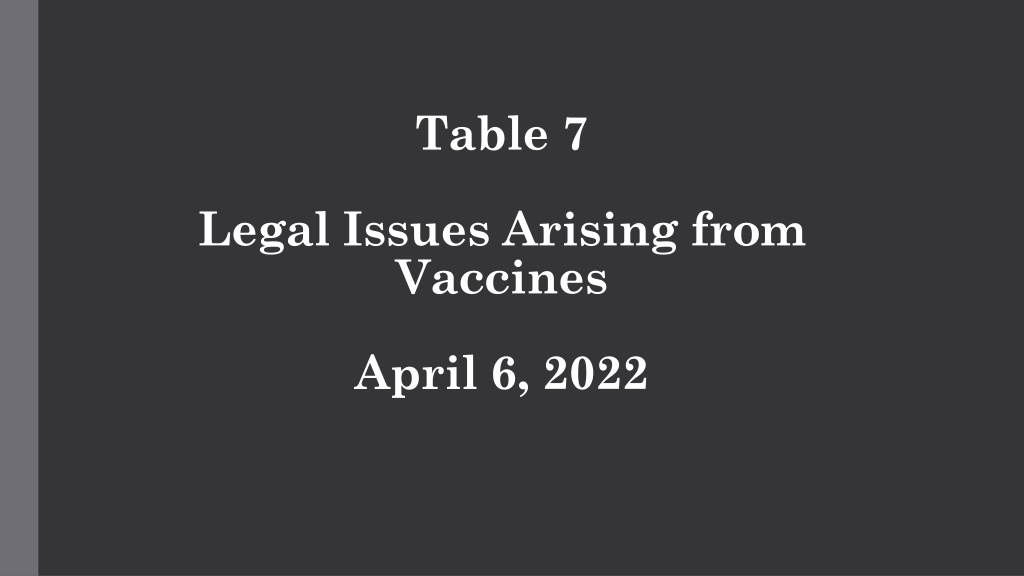
 undefined
undefined





